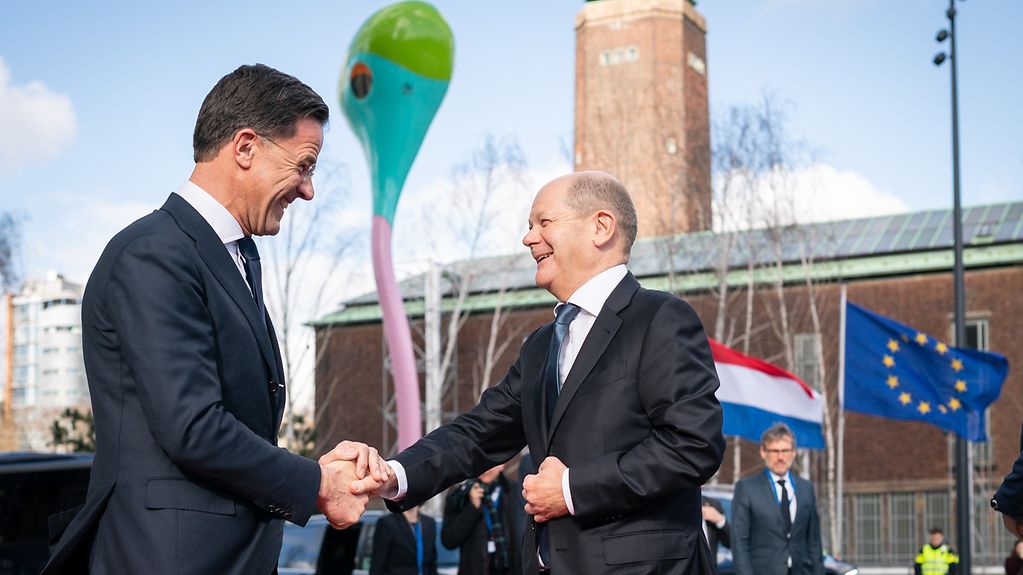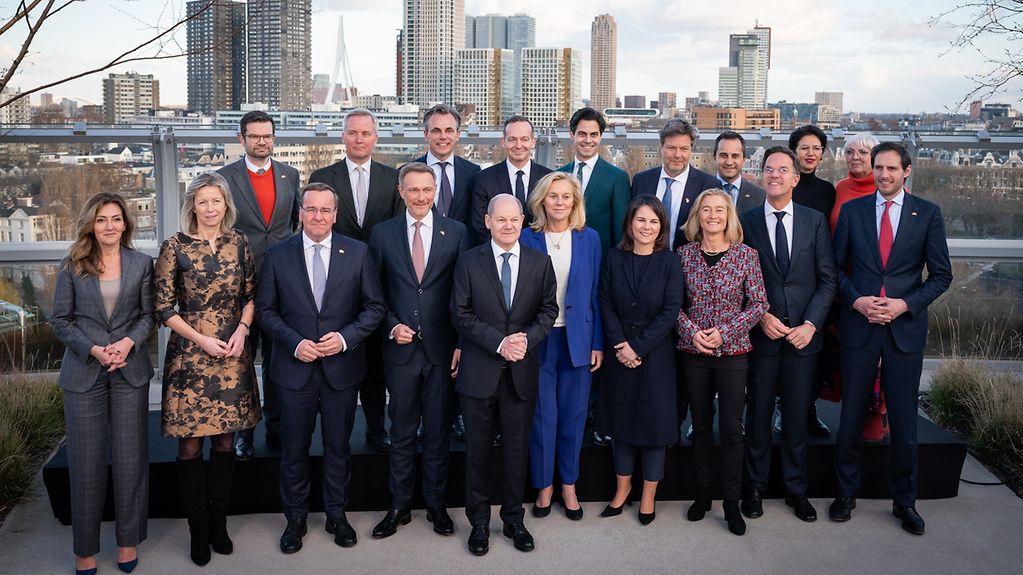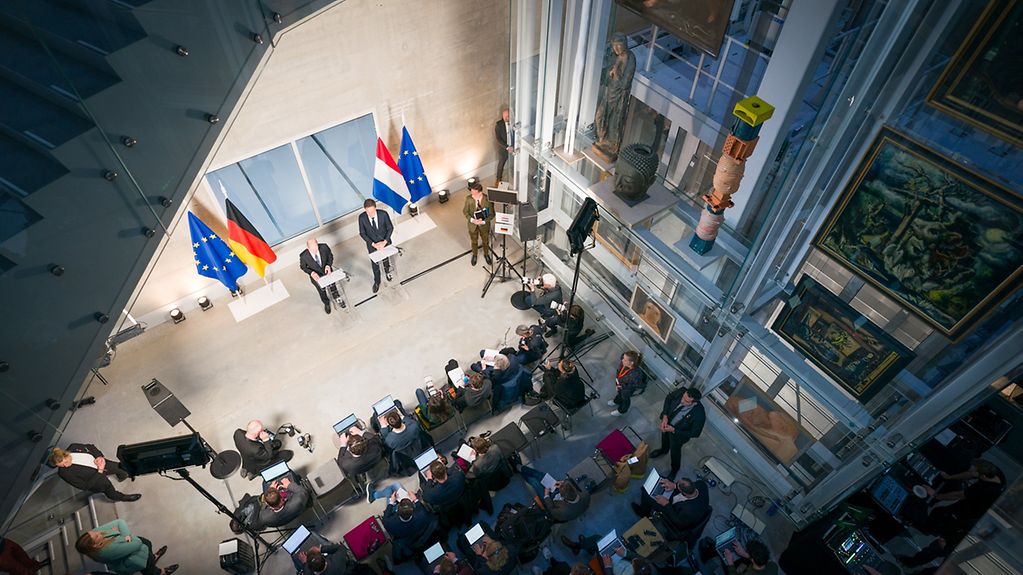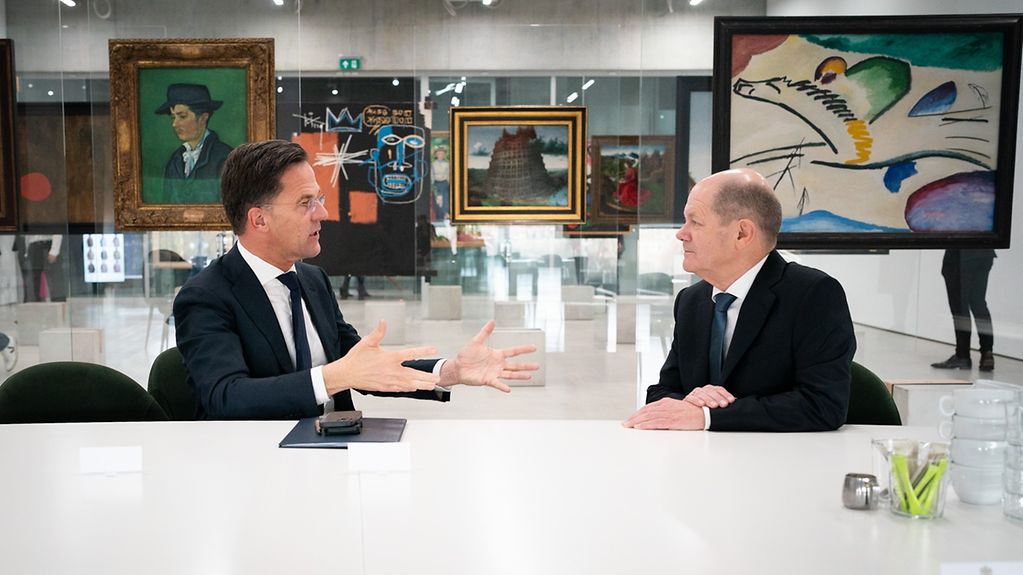German-Dutch intergovernmental consultations
It was a good thing that Germany and the Netherlands were acting “in unison and close coordination” in view of the Russian war of aggression against Ukraine, said Federal Chancellor Scholz at the German-Dutch intergovernmental consultations in Rotterdam on Monday. He thanked the Netherlands for helping Germany with its energy supplies in the past year.
5 min reading time

The leader of the Dutch government received the Federal Chancellor in front of the Boijmans van Beuningen art depot in Rotterdam.
Photo: Federal Government/Kugler
Federal Chancellor Olaf Scholz met the Dutch Prime Minister Mark Rutte in Rotterdam for the fourth round of German-Dutch intergovernmental consultations. Various ministers took part in the talks, in addition to the two heads of government.
Federal Chancellor Olaf Scholz thanked the Dutch Prime Minister Mark Rutte for hosting the intergovernmental consultations in Rotterdam. Scholz pointed out that Germany and the Netherlands are close partners and good friends: “Our bilateral relations are already as close as they can be.”
Close connections
The German and Dutch economies, societies and armed forces were closely interlinked, which benefited both countries, said Scholz, adding that the key topics of the talks were security and defence, strengthening Europe and sustainability of society and the business sphere.

Various ministers took part in the intergovernmental consultations, in addition to the heads of government.
Photo: Federal Government/Kugler
Support for Ukraine – in unison and close coordination
A special focus was on the Russian offensive against Ukraine. The Federal Chancellor clarified once more in Rotterdam that this Russian aggression marked a turning point, and said: “It is a good thing that we are acting in unison and close coordination. We are side by side with Ukraine, which we are supporting politically and financially, and also by delivering weapons, and in particular through the military training that our two countries are providing.”
Germany and the Netherlands had delivered self-propelled howitzers and ammunition together, and were currently preparing to deliver Leopard 1 battle tanks together with Denmark, Scholz explained.
Strengthening NATO, realising accession processes
Europe’s security had to be strengthened further also in the context of NATO, Scholz stated, looking ahead to the NATO Summit that is taking place in Vilnius in July. The issue of deterrence would be discussed on this occasion, as well as stepping up of defence capabilities, he said. With regard to Finland’s and Sweden’s requests to join, the Federal Chancellor said: “I hope that we will then be able to welcome both countries to NATO.” He added that their accession would be a huge gain for security in the Euro-Atlantic area.
Integration of armed forces that is “unparalleled in Europe”
“Especially in uncertain times such as these, I am glad that our countries are also cooperating so closely on military matters,” the Federal Chancellor emphasised. He described the extensive mutual integration of the armed forces of the two countries as “unparalleled in Europe”.
The full integration of all three brigades of the Dutch armed forces into the structures of the German Federal Armed Forces would be completed in three days time, he said. Scholz pointed out that this was a milestone and an inspiration to continue and further intensify the military cooperation.
You can read the joint declaration from the German-Dutch intergovernmental consultations on 27 March 2023 here.
EU: adjusting rules for decision-making
Another topic that was addressed was the European Union’s ability to act in international politics. “We agree that the EU should become stronger inside and out. For this we need more decisions to be made on a qualified majority basis. This is the only way in which a European Union with further members can retain its ability to act,” Scholz stressed.
On the issue of migration and in view of rising arrival numbers, the Federal Chancellor called for a united and crisis-proof asylum system in Europe. This required for the reform of the joint European asylum system to be concluded swiftly, he said.

The press conference took place in the foyer of the art depot.
Photo: Federal Government/Kugler
Determination on the path towards climate neutrality
The fight against climate change also played an important role in the consultations. “We are pursuing the path towards climate neutrality with determination, while still maintaining our industrial basis as the foundation of our countries’ prosperity,” the Federal Chancellor highlighted. With its industry plan for the “Green Deal” the EU Commission had laid the foundations for this debate, Scholz explained and added: “The transformation requires funding.” This was why a further consolidation of the capital market union was key, Scholz said: “If we harness our combined forces, including those in the private sector, this will enable us to generate stronger growth.”
Scholz emphasised that Germany and the Netherlands wished to cooperate even more closely in the areas of energy, industry, innovation and infrastructure, and that this had also been addressed in the conversations with the ministers.
Grateful for solidarity
Federal Chancellor Scholz took the visit to Rotterdam as an opportunity to express his gratitude for the Netherlands’ support in the past year. Germany had realigned its entire gas supply from East to West in response to Russia’s invasion of Ukraine. “All of this would not have been possible without the comprehensive support from our Dutch friends. At this point I’d like to say: Thank you for your solidarity!”
Another important step for strengthening Germany’s energy security was the initial agreement that had been reached for taking over the German Tennet subsidiary, Scholz said. “It is important here that this will be linked to close cooperation in the area of the network also in the future.”

The art depot stores and organises a collection of more than 150,000 works of art.
Photo: Federal Government/Kugler
Participants from the Federal Government in the fourth German-Dutch intergovernmental consultations:
- Olaf Scholz, Federal Chancellor
- Robert Habeck, Federal Minister for Economic Affairs and Climate Protection
- Christian Lindner, Federal Minister of Finance
- Annalena Baerbock, Federal Minister for Foreign Affairs
- Marco Buschmann, Federal Minister of Justice
- Boris Pistorius, Federal Minister of Defence
- Volker Wissing, Federal Minister of Digital Affairs and Transport
- Claudia Roth, Minister of State, Federal Government Commissioner for Culture and the Media
- Mahmut Özdemir, Parliamentary Secretary of State, Federal Ministry of the Interior and Community